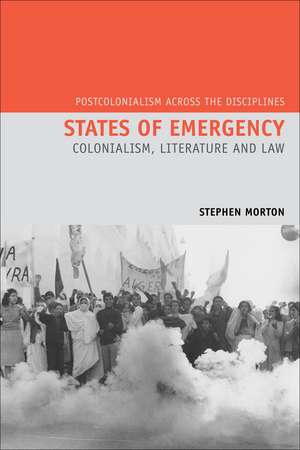States of Emergency – Colonialism, Literature and Law
Autor Stephen Mortonen Limba Engleză Hardback – 3 feb 2013
States of Emergency examines how violent anticolonial struggles and the legal, military, and political techniques employed by colonial governments to contain them have been imagined in both literary and legal narratives. Through a series of case studies, Stephen Morton considers how colonial states of emergency have been defined and represented in the contexts of Ireland, India, South Africa, Algeria, Kenya, and Israel- Palestine, concluding with a compelling assessment of the continuities between colonial states of emergency and the war on terror in Iraq, Afghanistan, and Pakistan.
Preț: 480.76 lei
Preț vechi: 895.99 lei
-46% Nou
Puncte Express: 721
Preț estimativ în valută:
91.99€ • 96.29$ • 76.57£
91.99€ • 96.29$ • 76.57£
Carte indisponibilă temporar
Doresc să fiu notificat când acest titlu va fi disponibil:
Se trimite...
Preluare comenzi: 021 569.72.76
Specificații
ISBN-13: 9781846318498
ISBN-10: 1846318491
Pagini: 249
Dimensiuni: 163 x 239 x 15 mm
Greutate: 0.54 kg
Editura: Liverpool University Press
ISBN-10: 1846318491
Pagini: 249
Dimensiuni: 163 x 239 x 15 mm
Greutate: 0.54 kg
Editura: Liverpool University Press
Notă biografică
Stephen Morton is senior lecturer in English at the University of Southampton. He is the author of several books and, most recently, coeditor of Terror and the Postcolonial: A Concise Companion.
Cuprins
A Note on Translations
Acknowledgements
Acknowledgements
Introduction
Part I
1. Sovereignty, Sacrifice and States of Emergency in Colonial Ireland
2. Terrorism, Literature and Sedition in Colonial India
Part II
3. States of Emergency, the Apartheid Legal Order and the Tradition of the Oppressed in South African Fiction
4. Torture, Indefinite Detention and the Colonial State of Emergency in Kenya
5. Narratives of Torture and Trauma in Algeria’s Colonial State of Exception
Part III
6. The Palestinian Tradition of the Oppressed and the Colonial Genealogy of Israel’s State of Exception
Conclusion
Bibliography
Index
Recenzii
“An impressive book on a fascinating and important subject.”
“Morton draws attention to the way the postcolonial state inherits the flawed rhetoric of exceptionality in the service of its own counter-insurgency operations. . . . his individual readings and astonishing repetitions of the same discursive pivot in these vastly different colonial settings always remain illuminating. . . . Highly recommended.”
